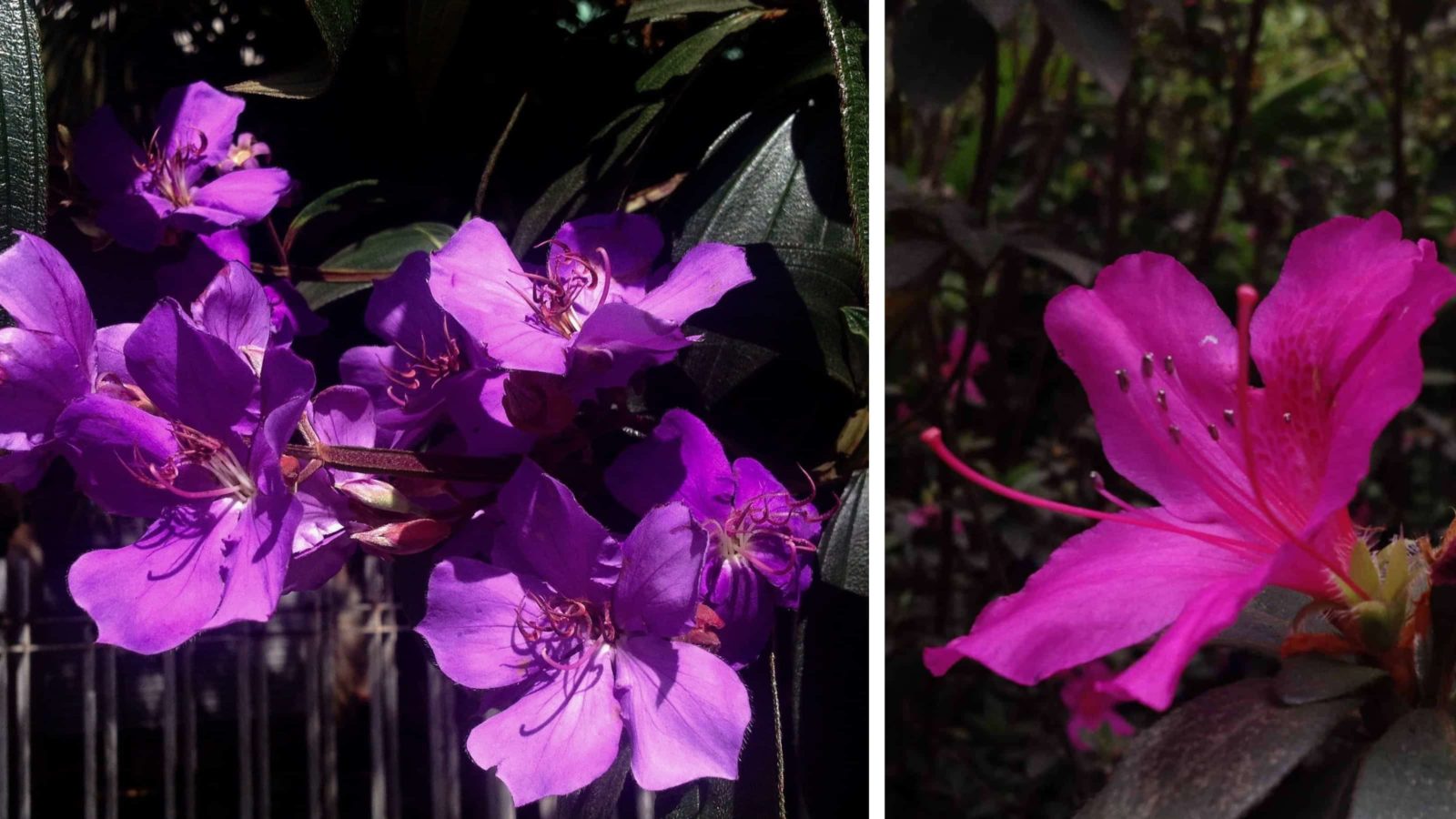‘It pisses God off if you walk by the color purple in a field somewhere and don’t notice it.’
In 1982, Alice Walker published those famous words in her book The Color Purple.The book brought to life a host of vivid characters: Celie, Nettie Harris, and Shug Avery, the woman who spoke the quote above. A year later, the novel won the Pulitzer Prize, cementing Walker’s rightful place in American literature. In many ways, this “walk by the color purple” demonstrates the centeredness of nature in Walker’s large body of work.
Like Walker, Z Estimé, Roots Rising’s new Summer College Intern, has been grappling with this dual essence of nature: despair and redemption.
Walker grounds her writings in a unique environmental theory that relates her disconnection from nature with larger systems of slavery, sharecropping and the forced removal of Indigenous people from their homes.
Throughout her life, she was deeply invested in conversations around nature and the life of the planet. In 1991, she published her anthology, Her Blue Body Everything We Know: Earthling Poems, 1965-1990 Complete. The collection of poems demonstrates her journey wrestling with her family’s personal history (as well as this nation’s history) with slavery and religion.
In her poem “Pagan”, Walker explores her relationship with Christianity and its impact on her ancestors’ connection with the environment:
‘Pagan.
See this was our religion all along.
Hidden even from ourselves
taught early not to touch the earth …’
— Blue Body, 420
Walker grew up surrounded by nature. In her thesis “There is Water in the World For US: The Environmental Theories of Alice Walker,” Janae Lewis Hall explains: In her childhood, Walker would regularly fish with her parents, play in nearby springs, and even farm. Growing up in Eatonton, George, however, meant that she dealt with rampant racism due to segregation and the aftermath of slavery in the south.
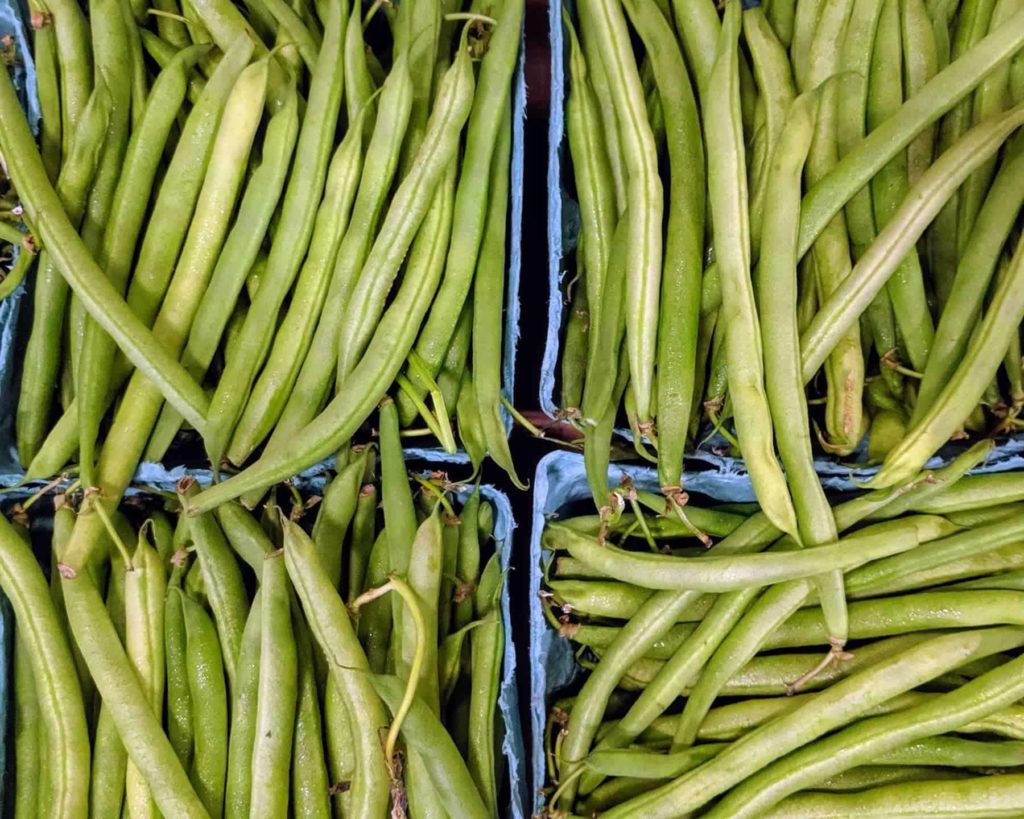
Green beans from local fields wait for delivery at Roots Rising's weekly farmers market.
All of this pushed Walker to highlight the many structures at play that have prevented people from “expressing the magical intimacy we felt with [Creation].” She understood nature as both a place of despair and a place of redemption.
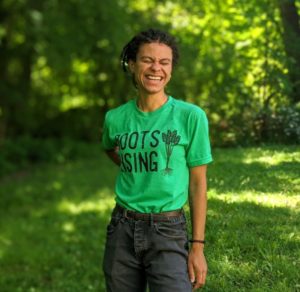
Z Estimé comes as a consultant to Roots Rising in summer 2020.
Z too describes their connection with nature as “deconstructing and reclaiming, healing [my] relationship to [a] land, that I have always been told in history class has been a source of slavery and pain.
Indigenous people never saw land as a singular person owning something… so why I would personally want to own land [when] it should never be owned?”
Estimé described their journey with the environment beginning first and foremost at home in rural Massachusetts, where creativity and imagination played a huge part in their childhood. Even so, like in many American households, Estimé’s relationship with food, sustainability and the environment was a complicated one.
As they studied at Mount Holyoke Community College, and then later at Mount Holyoke College, as an anthropology major, they began to explore the larger systems at play that had made it difficult for them to prioritize health and wellness at a younger age.
‘My process as a younger person, learning about my passion, my curiosity, has always intersected with working with older people, and like speaking about [what] land can be, and what space, a free space, without having to pay anything, can look like.’
“Learning anthropology and breaking down social structures and [learning about] these economic structures that have taken our people from the environment, in relationship to food, has broadened my identity with the environment.”
Similar to Walker, Estimé acknowledges the complex and sometimes, overwhelming systems that have impacted the ways people relate to nature. Acknowledging the difficulties, they have found hope and rejuvenation in intergenerational collaboration.
They credit this appreciation to both an older mentor and their time spent at community college, a place “where older people coming back to school and younger people from all walks of life, Black people, Brown people and White People [mix] together and really [create] a beautiful space.”
Estimé has found this intergenerational unity in local Berkshire organizations that focus on redefining how people of all ages connect with and value nature.
“I personally didn’t know what my needs were [until] I started gaining more mentorship,” they said, “… and that’s how I came into contact with Soul Fire Farm and Harmony Homestead… with Star Seed … These are land-based organizations that are really trying to work with folks of color. My process as a younger person, learning about my passion, my curiosity, has always intersected with working with older people, and like speaking about [what] land can be, and what space, a freespace, without having to pay anything, can look like.”
This emancipatory element is reminiscent of Walker’s Her Blue Body. Although Walker associates her distance to nature with her Christian upbringing, both activists are re-imagining not only reconnecting to nature, but also to freedom. Walker describes this link as “touching the earth,” while Estimé emphasizes “reclaiming land.” Even so, both link the restoration of the earth with their personal bodies.

A member of the Roots Rising farm crew touches a sweet snap pea on the vine.
“When I say [reclaiming land], I am really speaking to reclaiming my body,”Estimé said, “and how my body is perceived. Because that is my motherland. This is my first birthplace, this is my place always. So as I have learned more about my intersectional identity — more about race, gender, sexuality — [it] has opened up my awareness that land itself, the very soil we walk on is the macro-body of my micro-body. It’s so huge y’know.
But my own understanding of my body is where I have seeded my work”
From Maharshi Kapila’s philosophy of Samkhya Darshana to Plato’s Timaios, Estimé’s comment represents a long tradition of seeing the human body, not as something separate from nature, but as the central part of it. While each of these thinkers speaks to different aspects of nature, all are recognizing the vast connection between the microcosm (the body) and the macrocosm (the world).
One only needs to look at the work of Polish photographer Alicja Brodowicz to understand the physical similarities between the “surface of water, grass, tree bark, dry leaves,” with “[the body’s] fragments: hair, scars, texture of skin, wrinkles.”
Estimé said, “So to me it has been a lot about reclaiming my body [in order to] be able to speak to people with resources who happen to be White, and come from a place of bridging and a place of love. I can’t hold the hate with which my ancestors’ choices were taken away.”
They attribute this ability to speak from a place of love to the mentors that have guided them. After working with organizations like Soul Fire Farm, and the Great Barrington Railroad Street Youth Project, Estimé realized their passion: involving young voices into these crucial conversations.
“That’s when I started really looking at youth advocacy,” they said, “and youth reclaiming their relationship to land. And asking younger people what they want in a piece of land.”
This passion for youth justice brought them to work as an intern over the summertime with Roots Rising. The organization’s Pittsfield Farmers market is the first teen-run market in the Berkshire area, and even in the pandemic, youth continue to be the foundation of both the market’s inviting ambiance and daily upkeep.
In an ordinary harvest season, youth in the Market Crew would partner with 17 local vendors like Cricket Creek Farm and Square Roots Farm, picking produce, setting up, and even offering workshops on agriculture sustainability.
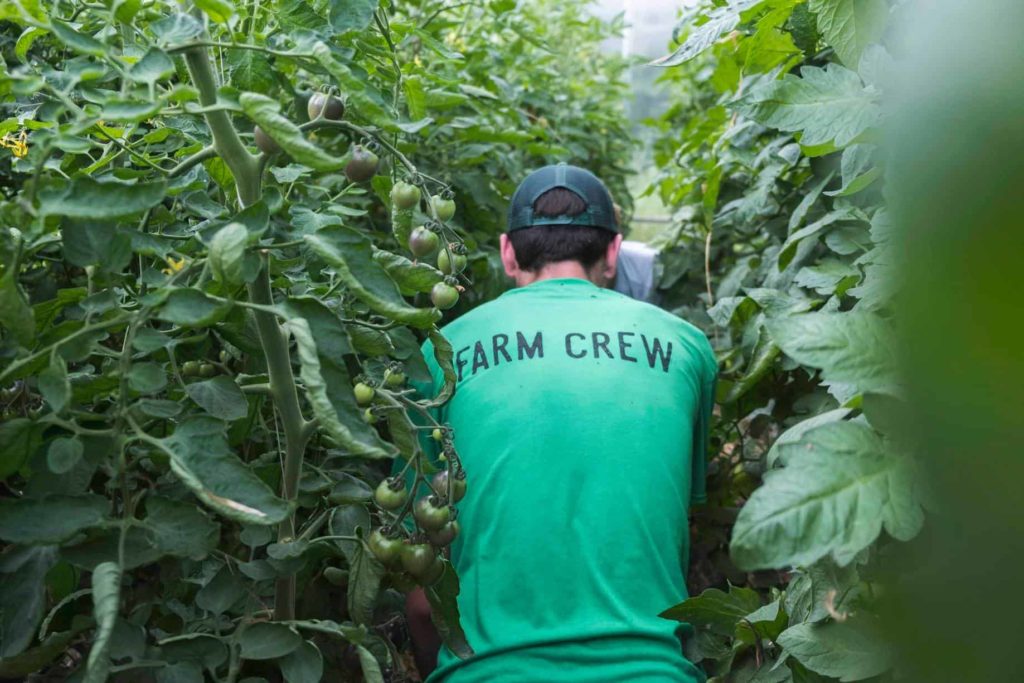
A member of the Roots Rising farm crew walks through long rows of produce in the field.
Co-founder Jamie Samowitz described the market as a “third home,” a space where teenagers are “seen for their full humanity.”
As of March, Roots Rising has halted youth crews — Farm crews, Market Crews, Truck Crews — until further notice. Even so, like many communities and organizations adjusting to a more precautious lifestyle, Roots Rising has been reflecting on how to best support their young members.
Youth Crew alumni who are 18 and older have been volunteering for Roots Rising’s new Virtual Farmers Market.

A volunteer with Roots Rising's online markety carries herb seedlings.
Throughout the summer, Estimé has led a pilot summer program for the organization’s teenagers, centered on fostering virtual togetherness in a time of social distance.
Estimé grounds their work with youth and the environment in their personal journey learning how to reconnect and value their multidimensional identities.
“So I initially approached them with youth justice in mind, knowing that a large portion of Pittsfield is of color, [in order to] have conversations around race and class. My experience, especially with Covid, has been… that [Samowitz and Vecchia] hope I can continue bringing in this conversation.”
Having conversations on race, and class can be challenging, however. Especially, when Estimé has talked with people who do not respect or affirm their many identities.
“Sometimes when I walk into a space, I see my body literally transform before my eyes by someone else. I still am who I am, [so] I see it as a reflection of how I perceive them seeing me. It is still me perceiving another person’s perspective but it’s my experience… It could be a mixture of racism, classism, sexism, homophobia… all of those intersect.. And [intergenerational collaboration] has been about me learning how all of those intersect… and showing that to an older person…”
Cooperation, Estimé emphasized, does not mean ignoring one’s feelings. Instead, it means confronting people that may make them feel painfully out of place in their own bodies in order to get at the source of the issue.
It means “speak[ing] to White folks who have those resources, that they need to give it back with no strings attached… To say that with such conviction only came from my understanding that I had to untangle so many extractive practices within my own body.”
Estimé grounds their self-reflection, “in nonviolent communication and really learning how to speak from an “I” statement, where I know that I am not always right or will ever be right.. But I know that I can track how my body is reacting to something even if I don’t know where it is coming from.”
For Estimé, their resilience is tied as much to reclaiming the earth as it is to communicating with the people around them. Reflecting on their work with BIPOC-led Soul Fire Farm that demands reparations for Black and Indigenous people, they said:
“I am unlearning greed, and sharing in a process [that is] in direct relationship to the land… the idea that I need to own more land, to compete with someone when I could collaborate with someone and make something pretty damn beautiful… it comes from this capitalistic society that really enforces greed. I’m not against capitalism but I am certainly about cooperatives and transforming how we use our economic systems right now.”
‘When I say [reclaiming land], I am really speaking to reclaiming my body and how my body is perceived. Because that is my motherland.’
Getting to this place of self-acceptance has been a long journey for Estimé, but they said they are finally at a place “where I can exist in my body and feel good, even when people are telling me that I ain’t shit! I can still still feel my body and be in my body.”
They credited their strong sense of self to the family that they have created working with organizations like Soul Fire Farm.
“I think its been that I come from a tribe, others might call it a chosen family, but a group of people, including people from Soul Fire Farm, that I see work upon their bodies and work upon themselves on a daily, hourly basis to show up for folks like me who are still learning about untangling the ways that we hurt ourselves.”
During points in their life when they have felt unsure of their activism they relied on the people around them for support and guidance.
They said, “So working with Black farmers who are really conscious of colonization, in the ways that we construct land in very sustainable ways, and to see that in relation to their own bodies, having that in my life when I am speaking to White farmers, I come knowing that, that I have love in my life, that I have people who will hold me.”
During difficult times, they reaffirm that “the fight that I am fighting is worthy.”
“I am encroaching on something that puts their [White racist farmers] whole life into question. I recognize that is where a lot of the fear comes from… if I am asking folks to look at themselves in a way they don’t want to… [Sometimes] my initial response is anger… [but] I have learned how to walk away and [still continue] to hold a lot of love for people who are still on that learning journey.”
As difficult as it may be, Estimé prioritizes this community in their activism. This component is at the core of Roots Rising’s mission.
Co-founder Jamie Samowitz said the program strives to create an honest dialogue between the teenagers, volunteers and directors who collaborate during farm crews. In order to do this, Roots Rising promotes a “Real Talk motto” of “self-knowledge equals power.”
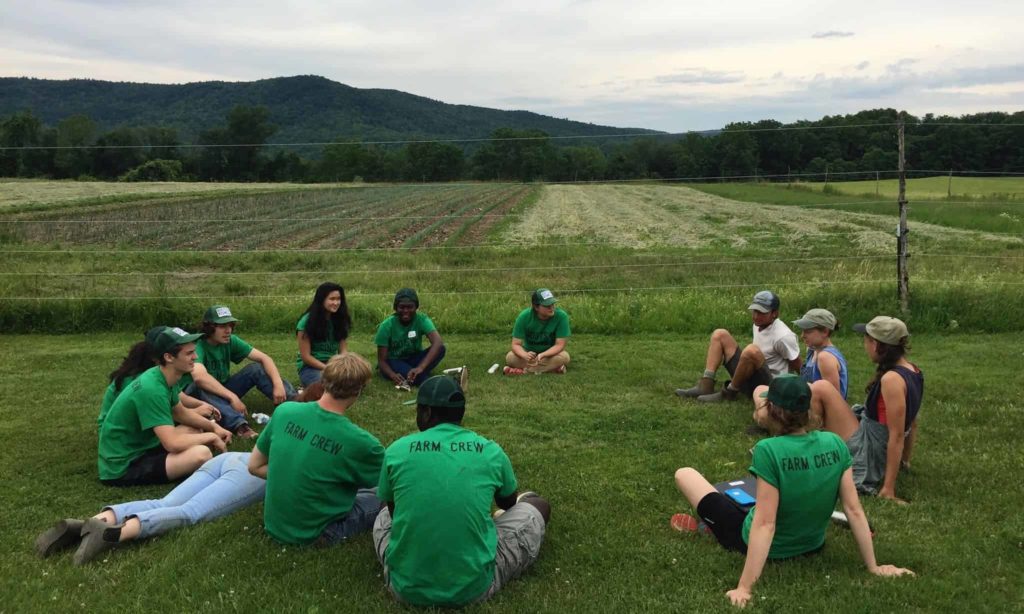
Teen members of the Roots Rising farm crew gather in the fields.
These conversation sessions require a certain level of vulnerability that Samowitz believes can only happen because of the hours of trust-building shared between willing participants.
For five weeks from July to early August, Pittsfield teenagers in the Summer Work Crews have found both employment and solace in local farms. Working beside Samowitz and Vecchia from 8:30 am to 4:30 pm for five days a week, work is hard but fulfilling. After working, “Real Talk” provides a space for people to express their emotions.
Samowitz said, “Real Talk’ is a place where people are giving and receiving feedback to everyone, staff included. We express the ways we want to grow. One brave volunteer raises their hand and we tell them what we are seeing, [and whether it] is helping them make their goal. Feedback is given out of guidance: What resonated? What is true?”
Samowitz understands that for many, remaining open to suggestions that address your vulnerabilities may be incredibly scary — seemingly impossible.
She certainly doesn’t downplay the difficulties of establishing such a unique space. Even so, she emphasizes the importance of stepping outside of one’s comfort to connect to one another. Although challenging, these forms of genuine communication are at the heart of the organization’s objective.
“People’s social masks fall away,” Samowitz said, “even turning to make eye contact and listening deeply… Some people have never heard such positive things before. It is a space where people are being seen for their full humanity. [This] is the deep work that we are doing. Its at the heart of what we are doing”
Such forms of intimacy are difficult to maintain in face-to-face sessions, nonetheless during a global pandemic. The creativity of the virtual farmer’s market run by Vecchia and Samowitz, and the summer program run by Estim<é, however, prove the organization’s commitment to community engagement.

Teen members of the Roots Rising farm crew talk with Z Estimé online.
Estimé is hoping to build off of this strong foundation to create a space that fosters an open dialogue between participants. They describe their summer internship as a “blueprint” for future initiatives at Roots Rising that builds from the feedback and opinions of the teenagers involved.
These months shared with youth are grounded in introspection and in reconnection to the organization. They will be talking about vulnerable topics like mental health, partnering up with New York City-based choreographer and artistic director Dante Brown, and linking with dance ensemble Jacob’s Pillow in Great Barrington.
“It’s a place where alumni can gather, where Jess and Jamie can ask questions [on] what we learn and what we share with one another. The idea would be that it becomes bones that can be restructured into a body,” Estimé said.
‘[In my personal life], I hold space with people that I love, and those people are on the spectrum of race, and if I don’t have love for myself and compassion for people who don’t always have the same values, I won’t be able to see my friends in all of their dimensions, or to hold them accountable.’
“They [Jess and Jamie] hope one day a young person can be a board member,” Estimé said, “and have intergenerational communications around what the future of Roots Rising is and how can it best serve young people and really impact the community in a way that holds anti-racism… it holds each other [both anti-racism and Roots Rising] accountable.”
For Estimé, tackling anti-racism requires critiquing “white dominance… white extraction.” It means paying close attention to re-orient words, they said, “so that… I am personally talking about privilege, [and] how I have avoided the types of connections that would really fill up my life. [This comes with] so much connection with myself.”
While Estimé is categorically the leader of the program, they “don’t want my voice to be the only one in that space. [I want to] encourage a type of communication of being present in your body and noticing where your emotions are. [This means] recognizing different types of intelligences that offers an opportunity for folks to be really transparent.”
Just like the difficult but rewarding conversations that took place during Real Talk, Estime hoped this summer to tackle sensitive subjects like race, gender and identity with these younger participants.
“They all know each other,” they said, “so that’s why we have been able to just jump in… that speaks to Roots Rising. They feel like a crew.” Regardless of the topics at hand, they have trust that those involved will value the exchanges of each person’s lived experiences.
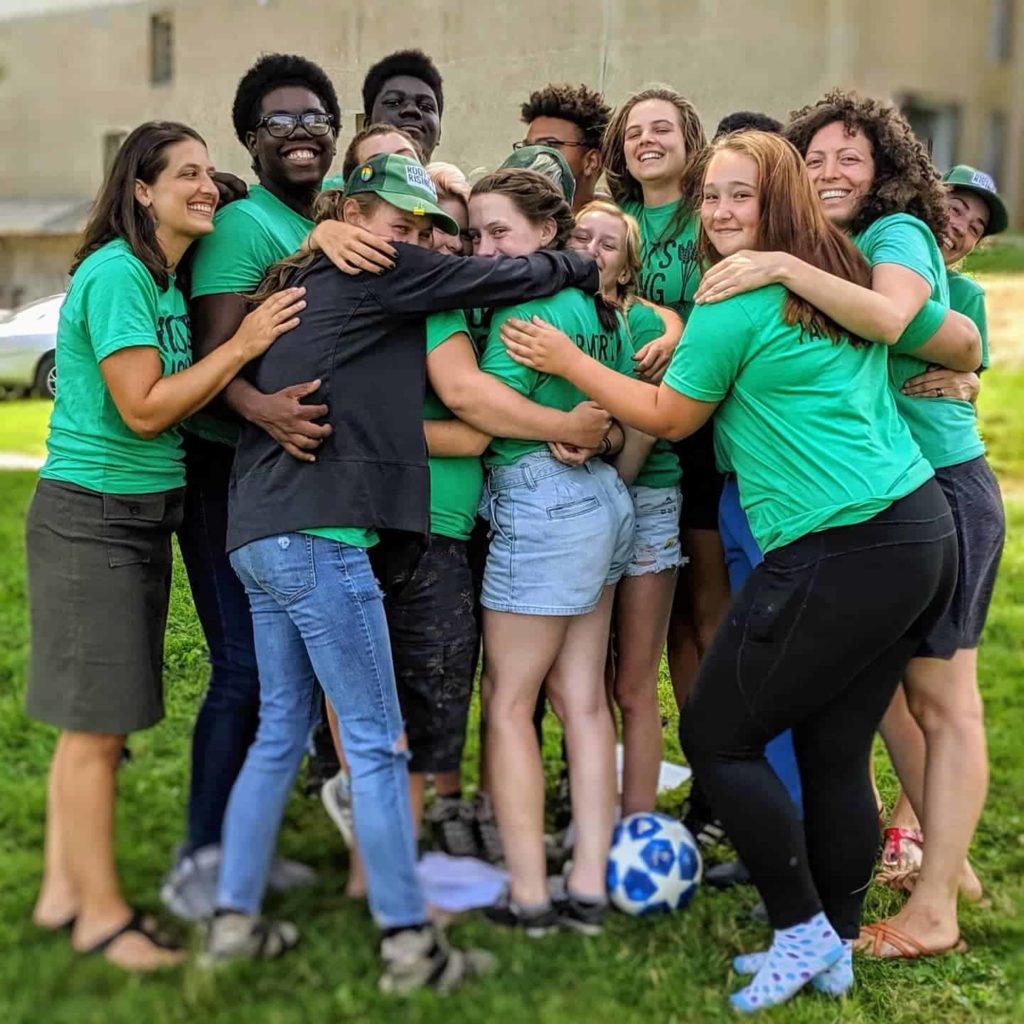
Teen members of the Roots Rising farm crew lean into a group hug.
“My most profound moments of growth are when I am challenged. If I am in a space where young people aren’t being heard… or specifically a White person is speaking on ideas that relate to Black and Brown people and those people are not [getting the space to speak]… Intergenerational collaboration is me bringing that up… but… still wanting to talk… So those are some hard conversations that I hope to have before I leave, I really trust these young people to value these conversations, they continue to surprise me.”
Estimé stressed that holding space for younger people to express their lived experiences is at the core of the summer project. They said, “Sometimes there can be a silencing that happens in this virtual world. So always being conscious of saying everyone’s name, or if someone hasn’t spoken on a topic,[asking them], ‘how are you feeling? Where are you at?’”
They pointed out that, “Black and Brown people are not always going to want to speak about what it always feels like. We experience that on the daily. So being a facilitator means being able to notice people’s input”
As the country grapples with the social limitations of COVID-19 , the summer program at Roots Rising is an example of how a community has prioritized togetherness. Although maintaining the same forms of communication before this ‘new normal’ is impossible, the program is a testament to how people are creating new spaces to strengthen their connection with others.
But as Estimé has emphasized, ‘togetherness’ does not mean ignoring different lived experiences, and the natural tensions that arise.
Instead, they said, “[In my personal life], I hold space with people that I love, and those people are on the spectrum of race, and if I don’t have love for myself and compassion for people who don’t always have the same values, I won’t be able to see my friends in all of their dimensions, or to hold them accountable.”

